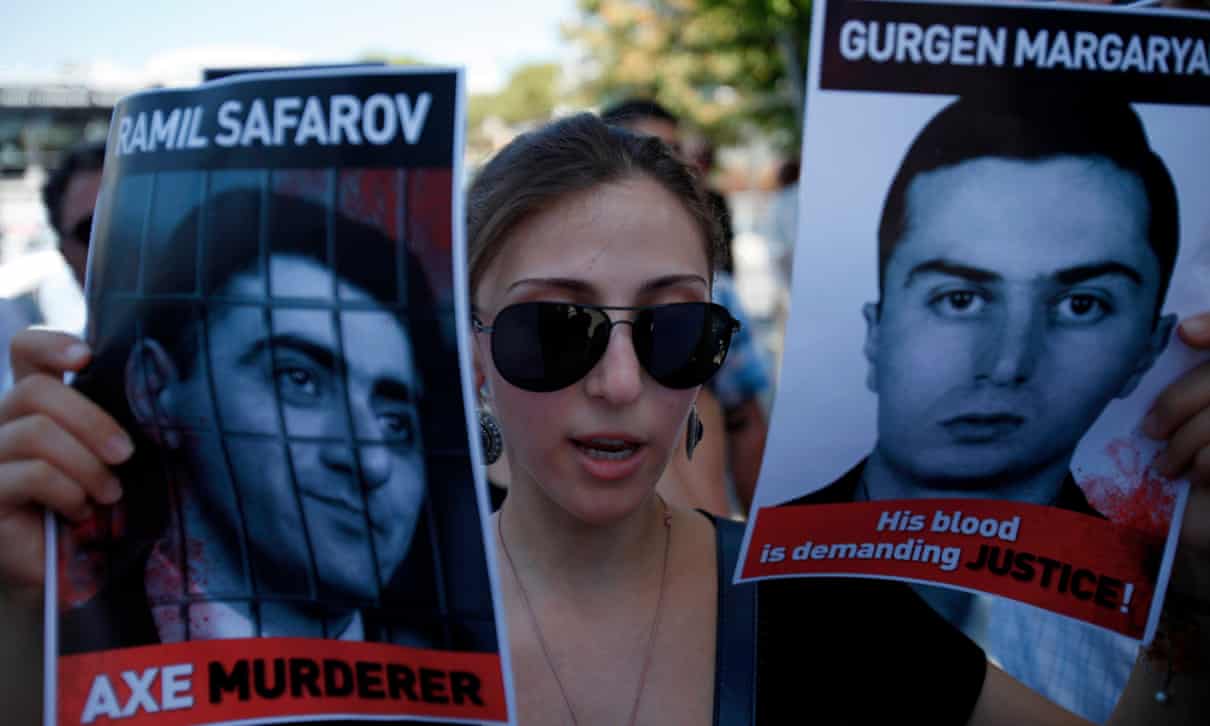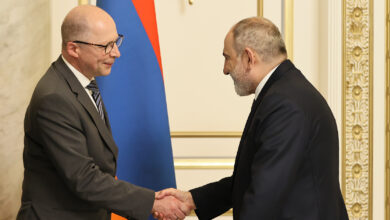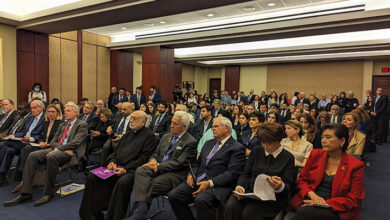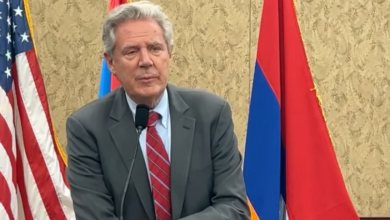
Azerbaijan violated the European Convention on Human Rights by releasing an extradited officer who had murdered an Armenian soldier during training in Hungary, the European Court of Human Rights said in a judgement today.
The Court found that although Azerbaijan had clearly endorsed Ramil Safarov’s acts, not only by releasing him but also by promoting him, paying him salary arrears and granting him a flat upon his return, it could not be held responsible under the stringent standards of international law which required a State to “acknowledge” such acts “as its own”.
Moreover, those acts had been part of a private decision and had been so flagrantly abusive and far removed from the official status of a military officer that the Court could not see how his commanding officers could have foreseen them or how Azerbaijan could be responsible for them just because he was a State agent.
However, it found that there had been no justification for the Azerbaijani authorities’ failure to enforce the punishment of Ramil Safarov and to in effect grant him impunity for a serious hate crime.
Moreover, the applicants had provided sufficient evidence to show that Ramil Safarov’s pardon and other measures in his favor had been ethnically motivated, namely statements by high-ranking officials expressing their support for his conduct, and in particular the fact that it had been directed against Armenian soldiers, and a specially dedicated page to R.S. on the President of Azerbaijan’s website.
The full judgement is below:
Whether Azerbaijan was responsible for the murder of G.M. and attempted murder of Mr Makuchyan under the substantive aspect of Article 2
The Court noted that the current standard under international law
set a very high threshold for State responsibility for an act otherwise non-attributable to a State at the time it had been committed. In particular, to find a State responsible under international law it had to have “acknowledged” and “adopted”, not just “approved” and “endorsed” the act.
The Azerbaijani Government actions as a whole, including the decision to pardon Ramil Safarov, promote him, award him salary arrears and grant him the use of a flat, had clearly and unequivocally demonstrated their “approval” and “endorsement” of his conduct.
Such endorsement was mirrored in statements submitted by the applicants that had been given by various Azerbaijani officials and other persons expressing personal approval of R.S.’s conduct, his transfer and/or pardon.
The Court agreed that many of the statements in question, as well as a
special section on the official webpage of the President of Azerbaijan with letters thanking the President for Ramil Safarov’s pardon, were particularly disturbing in that they glorified R.S. as a national hero for the gruesome crimes that he had committed.
However, the Court was not convinced that Azerbaijan had “clearly and unequivocally” “acknowledged” and “adopted” “as its own” Safarov’s deplorable acts, which had been part of a private decision.
Furthermore, the attack had taken place at night, outside of training hours, and there was no suggestion that he had committed the crimes on orders given by his superiors. The Court was not convinced either that such flagrantly abusive private acts, so far removed from Ramil Safarov.’s official status as a military officer, could have been foreseen by his commanding officers or that the Azerbaijani State could be held responsible for them under international law just because he had been an agent of the State.
Nor was there anything in the case file to suggest that the procedure in Azerbaijan for the recruitment of members of the armed forces and the monitoring of their fitness to serve at the time that R.S. was sent on his mission to Hungary had been inadequate.
Stressing that its assessment was based on the very stringent standards set out by international law, the Court held that there had been no substantive violation of Article 2 by Azerbaijan.
Whether Azerbaijan had complied with its duty under the procedural aspect of Article 2 to ensure enforcement of Safarov.’s punishment
The Court considered that Azerbaijan had assumed responsibility for the enforcement of Ramil Safarov’s prison sentence upon his transfer, and from that point on, it had been called upon to provide an adequate response to a very serious ethnically-biased crime for which one of its citizens had been
convicted in another country. Given the extremely tense political situation between Azerbaijan and
Armenia, the authorities should have been all the more cautious. Instead of enforcing Ramil Safarov’s sentence, however, he had been set free and treated as an innocent or wrongfully convicted person and bestowed with benefits that had not apparently had any legal basis under domestic law.
Moreover, the Court was not convinced by the reasons submitted by the Azerbaijani Government for Safarov’s immediate release. As concerned the alleged unfairness of the criminal proceedings, the Court found that Ramil Safarov had been tried in Hungary before courts at two levels, which had handed down well-reasoned decisions. In any event, if Ramil Safarovhad considered his trial unfair, he could have, but had not, lodged an application with the European Court against Hungary once the criminal proceedings against him had come to an end.
As to Ramil Safarov’s personal history and mental difficulties, they could hardly justify the Azerbaijani authorities’ failure to enforce the punishment of one of their citizens for a serious hate crime. In any case, his mental capacities had been thoroughly assessed during his trial in Hungary by medical experts who found that he had been able to understand the consequences of his actions at the time.
Indeed, the subsequent decision to promote Ramil Safarov would clearly suggest that the Azerbaijani authorities had deemed him fit to continue to serve in the military and that he had not therefore suffered from a serious mental condition.
Ramil Safarov had in effect been granted impunity in Azerbaijan for the crimes committed against his Armenian victims. That was not compatible with Azerbaijan’s obligation under Article 2 to effectively deter the commission of offences which put others’ lives at risk. The Court therefore held that there had been a procedural violation of Article 2 by Azerbaijan.
Whether Hungary had failed in its duty under Article 2 to ensure that Ramil Safarovwould continue to serve his prison sentence even after he had left the country
First, the Court noted that the Hungarian authorities had followed to the letter the procedure set out in the Council of Europe Convention on the Transfer of Sentenced Persons when extraditing Ramil Safarov.
No tangible evidence had been brought before the Court to show that the Hungarian authorities had unequivocally been aware or should have been aware that R.S. would be released by Azerbaijan.
Indeed, given the time already served by R.S. in a Hungarian prison, the Court did not see how the authorities of that country could have done anything more than respect the procedure and the spirit of the Transfer Convention and trust that another Council of Europe State would act in good faith.
Whether the Armenian ethnic origin of R.S.’s victims had played a role in the measures taken by the Azerbaijani authorities following his return
The Court noted that the Hungarian courts had found that the sole motive for Ramil Safarov’s acts had been the fact that his victims were Armenian. The ethnic bias of his crimes had thus been fully investigated by Hungary and the Court could see no reason to question the courts’ conclusions.
Furthermore, it was satisfied that the applicants had a sufficiently convincing prima facie case to show that the Azerbaijani measures in favour of R.S. had been racially motivated. In particular, he had been pardoned on his return, without any apparent formal request or any kind of reflection process or legal procedure. He had also been promoted and given various benefits, which, in the absence of any legal basis, had quite understandably been perceived as rewards for his conduct.
Moreover, it noted again the statements by Azerbaijani officials calling Ramil Safarov a patriot and a hero, as well as the special page dedicated to him on the President of Azerbaijan’s website. It deplored the fact that the majority of those statements had expressed particular support for the fact that Safarov’s crimes had been directed against Armenian soldiers and considered that the very existence of the website suggested that he had been pardoned because of the ethnic nature of his attack.
Two statements provided by the Azerbaijani Government, on the other hand, denying that Ramil Safarov ’s actions had been approved at an official level and that he had not been considered a hero in the country, were not sufficient to refute the overwhelming body of evidence from the applicants that the various measures leading to R.S.’s virtual impunity, coupled with the glorification of his extremely cruel hate crime, had had a causal link to the victims’ Armenian ethnicity.
The Government had failed to disprove the applicants’ arguable allegation of discrimination and there had been a violation of Article 14 in conjunction with Article 2 by Azerbaijan.
Whether the Azerbaijani and Hungarian Governments had failed to disclose documents
The applicants complained that both Governments had failed to disclose documents requested by them, referring in particular to Azerbaijan’s presidential order pardoning R.S. and the minutes of the meetings held by the president and the instructions issued by him relating to Ramil Safarov.
The Court found to the contrary that, at its request, both the Azerbaijani and Hungarian Governments had submitted the documents requested by the Court within the time-limit, including the presidential pardon decision.
It was not aware of any further document which the Governments could have provided for a proper and effective examination of the applicants’ case, but had failed to do so.
In conclusion, neither of the respondent Governments had failed to cooperate with the Court and there had been no violation of Article 38.
Just satisfaction (Article 41).
The Court held, unanimously, that Azerbaijan was to pay the applicants, jointly, 15,143.33 pounds sterling (GBP) in respect of costs and expenses.
This Chamber judgment is not final. During the three-month period following its delivery, any party may request that the case be referred to the Grand Chamber of the Court.
If such a request is made, a panel of five judges considers whether the case deserves further examination. In that event, the Grand Chamber will hear the case and deliver a final judgment. If the referral request is refused, the Chamber judgment will become final on that day.
In January 2004, Gurgen Margaryan and Hayk Makuchyan travelled to Budapest to attend a NATO-sponsored, English-language course. The two men, along with participants from each of the former Soviet Socialist Republics, including Azerbaijan, were provided with accommodation by the Hungarian University of National Defence.
On 19 February 2004, one of the Azerbaijani participants, Ramil Safarov, murdered Gurgen Margaryan while he slept by decapitating him with sixteen blows of an axe. Safarov then tried to break into Hayk Makuchyan’s room, shouting ethnic slurs, but was quickly apprehended by the police.
Ramil Safarov later admitted that he had murdered Gurgen Margaryan on account of his Armenian origin. He showed no remorse for the killing.
It emerged during the criminal proceedings that Ramil Safarov had purchased an axe in a local store with a view to killing both of the Armenian soldiers in order to mark the anniversary of the beginning of the conflict between Armenia and Azerbaijan over the disputed territory of Nagorno-Karabakh.
On 13 April 2006, the Budapest City Court found Ramil Safarov guilty of the premeditated murder of Gurgen Margaryan and preparation for the murder of Hayk Makuchyan. He was sentenced to life imprisonment (with the possibility of conditional release after 30 years) and his sentence was to be served in a Hungarian prison.
Ramil Safarov’s repeated requests to be transferred to Azerbaijan, in order to serve his prison sentence there, were initially refused by the Hungarian authorities. But the Hungarian Minister of Justice ultimately approved Safarov’s renewed request in August 2012.
On 31 August 2012, Ramil Safarov was transferred to Azerbaijan in agreement with Hungary under the Council of Europe Convention on the Transfer of Sentenced Persons. He was met with a heroes’ welcome upon his arrival in Baku. A few hours later, he was pardoned by President Ilham Aliyev, promoted to the rank of major, awarded eight years of salary arrears, and offered an apartment








